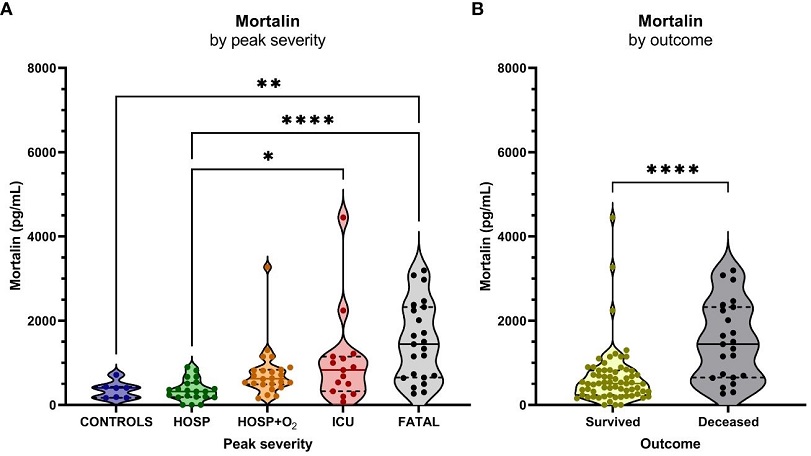Study Finds Circulating Mortalin In Blood And Activation Of The Alternative Complement Pathway As Risk Indicators In COVID-19 Infection
Nikhil Prasad Fact checked by:Thailand Medical News Team Apr 25, 2024 1 year, 9 months, 3 weeks, 5 hours, 50 minutes ago
COVID-19 News: The COVID-19 pandemic has reshaped healthcare paradigms globally, presenting unprecedented challenges in understanding and managing the disease's diverse clinical manifestations. Amidst this backdrop, a collaborative effort between Tel Aviv University in Israel and Semmelweis University in Budapest, Hungary, has yielded groundbreaking insights into potential risk indicators for severe COVID-19 infections. Central to this study that is covered in this
COVID-19 News report is the exploration of circulating mortalin levels in COVID-19 patients and its correlation with the activation of the alternative complement pathway.
 Mortalin levels and the COVID-19 disease outcome. (A) Mortalin levels by peak disease severity. Asterisks indicate the p-values obtained by the Kruskal-Wallis test with Dunn’s multiple comparison post hoc test (* p<0.05, ** p<0.01, and **** p<0.0001), non-significant differences are not indicated. (B) Relationship between mortalin levels and mortality. Asterisks indicate the p-value obtained by the Mann Whitney test (**** p<0.0001).
Mortalin and Its Significance
Mortalin levels and the COVID-19 disease outcome. (A) Mortalin levels by peak disease severity. Asterisks indicate the p-values obtained by the Kruskal-Wallis test with Dunn’s multiple comparison post hoc test (* p<0.05, ** p<0.01, and **** p<0.0001), non-significant differences are not indicated. (B) Relationship between mortalin levels and mortality. Asterisks indicate the p-value obtained by the Mann Whitney test (**** p<0.0001).
Mortalin and Its Significance
Mortalin, also known as GRP75, emerges as a pivotal player in cellular homeostasis, acting as a mitochondrial chaperone crucial for cell protection against various forms of damage and senescence. The study's primary objective was to ascertain the presence of circulating mortalin in COVID-19 patients' blood and evaluate its prognostic value in anticipating disease severity.
Methods
The methodology adopted for this study involved the use of enzyme-linked immunosorbent assay (ELISA) to quantify mortalin levels in the sera of 83 COVID-19 patients. These patients were stratified into four distinct groups based on disease severity: critical patients who either succumbed to the illness (FATAL) or required intensive care and survived (ICU), patients with mild severity necessitating hospitalization and nasal oxygen support (HOSP+O2), and patients who did not require oxygen therapy during hospitalization (HOSP).
Results
The findings unveiled a spectrum of mortalin concentrations in the serum of COVID-19 patients, ranging from 194 to 2324 pg/mL. Significantly, patients with higher mortalin levels exhibited a heightened risk of mortality, as corroborated by Cox regression analysis (HR=3.96, p<0.01) and Kaplan-Meier survival curves (p=0.0032, log-rank test). Notably, mortalin retained its status as an independent predictor of mortality even after adjusting for age, sex, and various complement activation products. Furthermore, a comparative analysis with complement activation data from a previous study within the same cohort revealed intriguing associations between mortalin levels and complement components, particularly higher levels of complement C3a but reduced levels of
properdin in patients with elevated mortalin levels.
Contextualizing COVID-19 Severity
The severity spectrum of COVID-19 spans from mild respiratory symptoms to severe systemic complications, including acute respiratory distress syndrome (ARDS) and multiorgan failure, often precipitating a higher mortality risk. Several risk factors contribute to this severity, including advanced age and underlying medical conditions such as cardiovascular disease, diabetes, and chronic respiratory ailments.
Complement System Activation
The study delves into the intricate interplay between COVID-19 pathophysiology and the complement system, elucidating how SARS-CoV-2 triggers complement activation, leading to the accumulation of cleaved complement fragments such as C3a and C5a. These fragments play pivotal roles in precipitating the infamous "cytokine storm" and ARDS. Notably, elevated levels of complement activation products, including soluble complement C5b-9 complex (sC5b-9), correlate with disease severity, paving the way for potential therapeutic interventions targeting complement components like complement C5.
Cellular Damage and Mitochondrial Responses
COVID-19's pathogenicity extends beyond respiratory symptoms, encompassing widespread cellular damage and release of damage-associated molecular patterns (DAMPs), including mitochondrial DAMPs like circulating mtDNA. The study's focus on mortalin stems from its critical role in mitochondrial function and stress response, evidenced by its release from complement-activated cells and its association with disease severity and mortality in COVID-19 patients.
Mortalin as a Prognostic Indicator
The study's pivotal revelation lies in the prognostic significance of circulating mortalin levels. Patients with elevated mortalin levels exhibited a starkly elevated mortality risk, suggesting its potential utility as an early indicator of severe disease outcomes. This finding underscores the importance of quantifying both mortalin and complement activation markers in guiding clinical management strategies for COVID-19 patients.
Implications and Future Directions
The study's implications resonate deeply within the realm of COVID-19 management and research. Quantifying circulating mortalin alongside complement activation markers offers a promising avenue for identifying high-risk patients and tailoring treatment approaches accordingly. Moreover, the study prompts further investigations into mortalin's mechanistic role in disease progression and control, potentially positioning it as a therapeutic target for mitigating COVID-19's adverse outcomes.
Conclusion
In essence, this study sheds light on the intricate web of molecular events underlying severe COVID-19 infections, emphasizing the prognostic value of circulating mortalin levels and complement activation pathways. As the scientific community continues its relentless pursuit of effective COVID-19 management strategies, studies of this nature serve as guiding beacons, steering us towards personalized patient care paradigms and targeted therapeutic interventions in combating the ongoing pandemic.
The study findings were published in the peer reviewed journal: Frontiers in Immunology.
https://www.frontiersin.org/journals/immunology/articles/10.3389/fimmu.2024.1337215/full
For the latest
COVID-19 News, keep on logging to Thailand Medical News.
